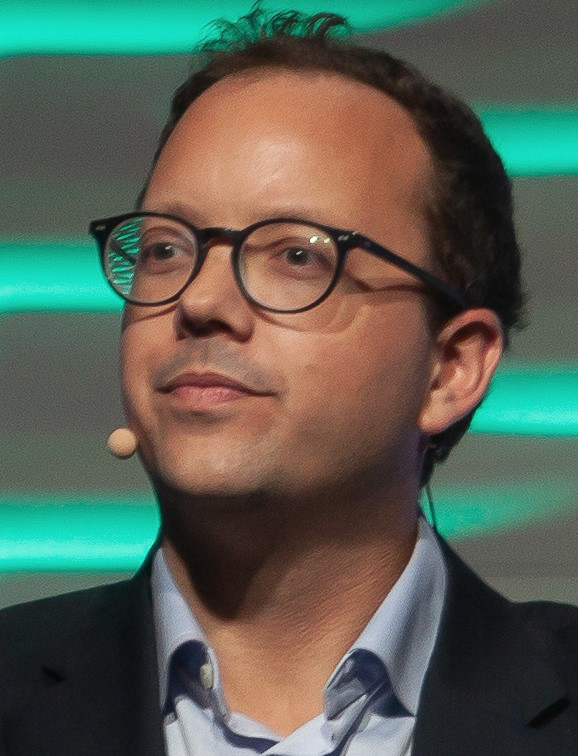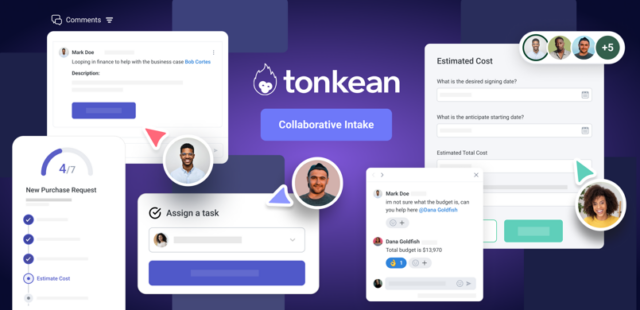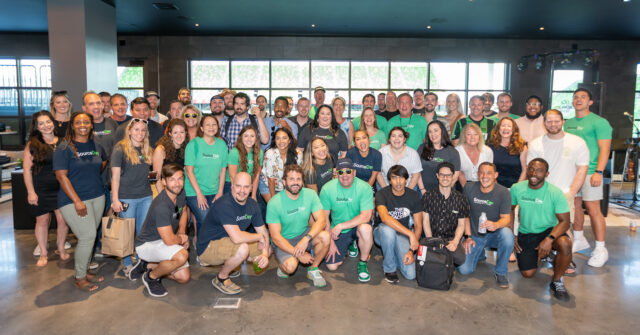“What if there was a better way to compare quotes from suppliers?”
This question led Edmund Zagorin down a road of discovery which culminated in turning an idea into a start-up.
While working as a procurement consultant, Zagorin observed how much time his sourcing teams spent building Excel pivot tables. The problem? Category experts needed to identify potential errors in supplier submissions at the item level before an award scenario could be properly evaluated. Together with childhood friend Ben Leiken, who had risen to become an engineering and product leader at SurveyMonkey, the idea was to find a way to automatically pre-populate text in a sourcing project with little to no manual data entry required from procurement users of suppliers. Leiken had seen firsthand the impact that so-called “smart defaults” could have on survey completion. And Zagorin knew that in procurement, more completions would mean more supplier offers, which could yield better commercial outcomes for the procurement team. Arkestro, then Bid Ops, was born.
Studies show that when procurement is able to predict a plausible range of commercial outcomes ahead of a supplier offer, there is enormous leverage created when the buying entity names the price. Summarising the past decade of research, Lewicki et al.’s 2007 “Essentials of Negotiation” states that “…whoever, the buyer or the seller, made the first offer… determined the final selling price, with higher final prices when a seller made the first offer than when a buyer made the first offer.”
For this reason, Arkestro customers began delivering material higher cost savings outcomes than traditional RFPs and RFQs, a fact that caught the attention of Ariba co-founder Rob DeSantis. Together, Zagorin and DeSantis brought together an experienced management team, led by IBM and Ariba alum Neil Lustig as CEO. Lustig’s experience as CEO of Vendavo, a predictive pricing company used by sell-side teams to achieve better negotiated outcomes, made him ideal to scale Arkestro into a global juggernaut.

Today, Arkestro is the leading predictive procurement orchestration platform that enhances the impact of procurement’s influence, especially for large manufacturing enterprises across any procurement activity and spend category that involves collecting a quote from a supplier. Arkestro turns the traditional procurement process on its head: instead of the supplier creating a quote or proposal and then a procurement analyst using competitive offers and benchmark data to decision the desirability of that offer or action an approval, Arkestro customers use a predictive model to benchmark a potential quote before contacting suppliers, putting procurement in a position of leverage to either ask for their desired outcome using an AI-generated Suggested Offer or generate an Instant Counter-Offer to any quote.
Arkestro then helps customers persistently monitor the changes in quoted price for this item across all procurement activities, tracking trends and changes and helping teams proactively uncover the optimal procurement configuration for each item and basket with respect to timing, geography, quantity, lead time and other attributes.
By embedding game theory, behavioural science and machine learning models directly into the procurement process, Arkestro enables customers to dramatically accelerate cost reduction projects, often with existing preferred suppliers and attain their best available cost outcome for every unique item more frequently and at greater scale across their spend. This predictive procurement approach is especially helpful for technical procurement categories such as highly engineered components, materials and capital equipment, as well as categories like metals, chemicals, food ingredients, MRO, packaging, logistics and even IT.
Enterprises who are on a journey to create sustainable and antifragile data quality for their procurement function are turning to Arkestro as the predictive approach eliminates the two manual steps that tend to introduce errors into item-level identifiers: the step where the supplier creates a quote, and the step where procurement analysts have to validate, correct, give feedback and approve it. By using a predictive model to generate and validate supplier offers, Arkestro offers a continuous improvement path for enterprises whose digital procurement journey includes cleansing item-level data to create a true item-based “data foundation.”
Transformation journey
And since its founding in 2017, Arkestro has been on quite the transformation journey. The company has expanded rapidly and scaled its product – as well as for spend categories and industries served – globally. In a little over half a decade, Zagorin, Leiken and their team have created a true enterprise grade AI infrastructure platform that can be embedded into the likes of spend management giants SAP Ariba or Coupa or used as a standalone database and application.
Despite significant success in a relatively short space of time, Zagorin is keen to stress that his initial vision was to solve a problem that he was also experiencing in the market. “Our growth has corresponded to a great degree with a widening of the aperture of where we feel predictive technologies can make an impact for procurement teams,” he discusses. “I think one of the other things just from a paradigm standpoint is that procurement processes involve a lot of manually created data. There’s a lot of data entry on the supplier side, procurement side and on the stakeholder side throughout the process. Every keystroke in every process introduces the possibility of human error.”
Predictive procurement is a new approach that suggests the data before a human user enters it. What Arkestro has introduced is the idea of predictive and working with customers to apply that at different stages of the procurement process through AI. “One of the things that’s also been interesting, and you’ve seen this in other areas of AI, is that you can cross a threshold where at some point in the model it gets good enough that it really provides exponentially more value as it’s being used,” he says. “As opposed to software, which traditional software degrades over time, it gets stale and the interface feels clunky. As new interfaces come out, AI has almost the opposite dynamic where it actually gets better. It’s smarter by itself just by people using it. That’s also been pretty exciting to see.”
Procurement’s evolution
Indeed, the procurement space is in a state of flux. Amid significant transformation driving the function forward, it has never been such an exciting time to be involved in the industry. The rise of AI and machine learning is having a seismic impact with there also being hopes that new technology could reduce the need to bridge talent gaps.
“If you asked five years ago what’s holding procurement back from digitally transforming the operation and living out your full potential, I think a lot of procurement professionals would’ve said how hard it was to hire,” Zagorin explains. “People were saying: ‘Oh we have data quality issues where it’s really hard to actually know what we’ve spent, what our spend per supplier looks like for our core geographies, let alone what we paid for each individual item. We went out and bought a bunch of digital platforms and we’re struggling to gain adoption which is related to the data quality issues.’ This is what I heard from executives when I was working in procurement. Because traditionally, if you have a process and it’s not being consistently used, then it’s not going to accurately represent the most important attributes or business logic of the data that’s moving through it.”
Despite the positive introduction of tech innovation, procurement has also had its challenges. Supply disruption as a byproduct of COVID-19, wars in Ukraine and in Israel as well as inflation concerns, it is fair to say the function has never been more talked about in the C-suite.
“Boom, there’s the next wave of Covid, or suddenly there’s a war somewhere in the world,” he shares. “It has felt like there’s always something and it really creates context switching for procurement teams which is stressful, plus being bad for productivity. This is especially the case for digital transformation projects in procurement, and it’s also demotivating because it makes people feel like they’re not making progress. This then means that the length of the project elongates and you have this kind of stuck-in-the-mud feeling that it’s hard to get quick wins and generate momentum. That’s what customers are thinking about as they are looking in the market to find a true partner not just for their digital journey, but for their AI journey.”
Given the speed of procurement’s evolution, there are voices that believe the function requires a rebrand. Gone are the days of procurement being regarded as a back-office function hidden away out of sight, today it stands as an exciting, dynamic force at the forefront of innovation. “I live in California where job titles are a little bit looser generally,” explains Zagorin.
“If we look at procurement needing a rebrand, the big challenge that I see with procurement is that the structure of a lot of these categories doesn’t necessarily correspond with either the activities associated with them or with the relationships with the suppliers within those categories. What we have in procurement with ‘category management’ is we’re frequently asking procurement professionals to be a jack of all trades and master of none within their categories. Perpetual ‘crisis-mode’ is not a recipe for letting up-and-coming procurement professionals develop the category knowledge and domain expertise that are traditionally necessary.”
Procurement’s bright future
Looking ahead, Zagorin believes there has never been a better time to be working in procurement. “The profession has a lot to offer, and it really is this huge engine of value creation at most big companies,” he explains. “Arkestro serves enterprise manufacturing companies typically with multiple plant locations which buy at both the corporate and the plant level creating a lot of item-level data quality issues. What we’re seeing is the ability for companies to get live on Arkestro in a matter of days and often deliver a payback period for their entire solution costs in a matter of weeks.
“If you look at deployments of enterprise technology five years ago, that’s a stark difference in terms of what procurement’s promising versus what it’s delivering and the time-to-value. We have a new generation of startups, from intake to tail spend to what Arkestro does, more on the strategic side and or on technical procurement categories and direct materials, often starting with a bill of materials and handling all the back-and-forth with the suppliers up to allocation, awarding and the purchase order. You have this cohort of startups that’s just getting bigger and more people are using us to run large physical manufacturing operations. There’s not a lot of direct competition in the space of these growth-stage startups.
“I think what’s going to happen is more and more companies are going to say if it makes business sense and we think there’s tangible value in doing it, then let’s find a way to test and learn. Let’s find a way to try it out to implement it in one geography or for one business unit or category and just see how it works. Five years ago, it was always easy to say we’re too busy or we have other stuff going on. What’s changing today is if you’re not testing and learning constantly from new technology, you’re going to miss out because the stuff that’s happening right now is world-changing.
“Generative AI and novel technical approaches to on-demand superintelligence are going to be as impactful to many enterprises as the development of the internet, not to mention human society at large. The people who are playing around with it and staying curious and running experiments are going to create a lot more value. They’re going to have a lot more fun, and they’re going to build great teams and organisations that lay the groundwork for the next generation of procurement professionals.”











